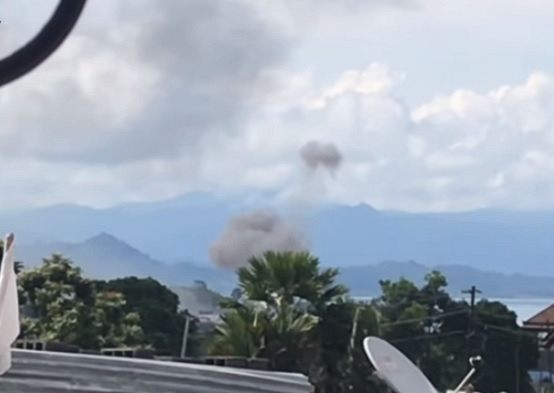Former diplomat Bruce Haigh has just returned from Mindanao, where he has been investigating the ISIS insurgency and the Australian response.

PHILLIPINES President Rodrigo Duterte predicted on 12 July that ISIS backed Abu Sayyaf rebels, who seized the central business district of Marawi on 23 May, would be evicted in 10-15 days. It is now mid-September and there is no sign of the Philippine Army loosening the rebels grip.
Perhaps military commanders and the President are seeking to limit politically unacceptable casualties, confident that the rebels will sooner or later run out of food and ammunition. But there is no sign of that and the suspicion must be that they are being resupplied. How? Who knows in a chronically corrupt Philippines?
The Australian Government, together with other regional governments, have taken the view that a prolongation of the siege is giving encouragement and confidence to Islamic extremists in Indonesia, Malaysia, Thailand and the Philippines to undertake further high profile military action. Australia has deployed two P3 Orion surveillance aircraft to Mindanao to provide intelligence to the Philippine Army.
On the 8 September, Minister for Defence Marise Payne announced the deployment of Australian troops to the southern Philippines to assist in training. Australian troops are more acceptable to Duterte than American troops and, depending on which regiments they are drawn from, may be able to undertake "active" or "live" training.
Sidney Jones, Director of the Jakarta-based, Institute of Policy Analysis of Conflict, believes Marawi has heralded in a new phase of regional Islamic militancy. She fears more moderate groups in the Philippines such as the Moro Islamic Liberation Front (MILF) have been marginalised. Negotiations that might once have taken place between them and the government over the future of an autonomous or independent Islamic region on Mindanao are less likely in the face of the growing influence of Maute-led, Abu Sayyaf militants now backed by overseas ISIS fighters from Indonesia, Malaysia and the Middle East. One of my interlocutors in Davao City last month claimed that the army had found 100 Indonesian passports in a recaptured part of Marawi.
Journalists and academics that I spoke to in Davao are critical of the government in Manila. They claim Marawi is a result of policies imposed on the region that lack understanding of local complexities. The genesis of the problem dates back several centuries to Spanish and American colonial occupation and exploitation of independent Islamic Sultanates. If there is a parallel the frustrations and aspirations of the Moro people might be compared to the Tamils of Sri Lanka.
However, what now considerably complicates an autonomy dispute is the presence of foreign ISIS fighters and operatives who have ingratiated and grafted themselves onto Abu Sayyaf, until now an indigenous militant group. Compounding this is the funding provided by Saudi Arabia through fundamentalist NGOs in Marawi and other parts of what is termed the Autonomous Region of Mindanao.
Journalists and academics that I spoke to in Davao are critical of the government in Manila. They claim Marawi is a result of policies imposed on the region that lack understanding of local complexities. The genesis of the problem dates back several centuries to Spanish and American colonial occupation and exploitation of independent Islamic Sultanates. If there is a parallel the frustrations and aspirations of the Moro people might be compared to the Tamils of Sri Lanka.
However, what now considerably complicates an autonomy dispute is the presence of foreign ISIS fighters and operatives who have ingratiated and grafted themselves onto Abu Sayyaf, until now an indigenous militant group. Compounding this is the funding provided by Saudi Arabia through fundamentalist NGOs in Marawi and other parts of what is termed the Autonomous Region of Mindanao.
The Saudi’s adhere to a fundamentalist Sunni belief known as Wahhabism within a broader framework of Salafism, both advocate violence toward opponents of those religious strands. The Saudis export Wahhabism through the funding of madrasas (schools) and NGO’s in Indonesia, Malaysia, the Philippines (Mercy Centres), even Australia. Other Sunnis and Shias condemn Wahhabism, which has been linked to the promotion of extremism and directly to the development of ISIS. Activities associated with institutions funded by Wahhabi (Saudi) money should be banned throughout the region. It is an exercise in guilt and self-delusion, as many in the ruling Saudi royal ruling regime observe rigid Salafi beliefs in the breach, preferring venality, misogyny and mendaciousness. The Saudi’s have strong protectors in the form of the U.S. government.
Some weeks ago, Foreign Minister Julie Bishop undertook to give $20m over four years to the reconstruction of Marawi. It is chicken feed. One of the reasons, if not the primary reason for the acceptance of the Wahhabi fundamentalist message is the anger and frustration engendered by poverty and the indifference, corruption and greed amongst the ruling elites in the aforementioned countries. Poverty and anger are the ingredients for radical politics — once Communism, now fundamentalism.
Some weeks ago, Foreign Minister Julie Bishop undertook to give $20m over four years to the reconstruction of Marawi. It is chicken feed. One of the reasons, if not the primary reason for the acceptance of the Wahhabi fundamentalist message is the anger and frustration engendered by poverty and the indifference, corruption and greed amongst the ruling elites in the aforementioned countries. Poverty and anger are the ingredients for radical politics — once Communism, now fundamentalism.
Finally, in my opinion, the question of joint naval patrols to interdict arms and ISIS personnel in the archipelagic waters separating Indonesia and the Philippines should be revisited.
[Bruce Haigh is a political commentator and retired diplomat. He has served in Saudi Arabia, the Gulf, Iran, Afghanistan, Pakistan and run the Indonesia section. Bruce still visits the Philippines and Mindanao from time to time and was last there a month ago. You can follow him on Twitter @BruceHaigh2.
https://independentaustralia.net/article-display/marawi-a-metaphor-for-islamic-extremism-in-asia,10717

No comments:
Post a Comment
Note: Only a member of this blog may post a comment.